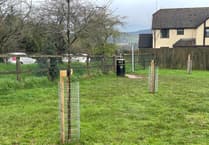KEITH Barker of Crediton, the author of “General Sir Redvers Buller VC 1839 – 1908, a brief biography” has responded to the “Courier” article (July 24) which asked the question:
He explains: “There are major monuments to Sir Redvers Buller in two cathedra and a massive memorial to him dominates the nave of Crediton Parish Church and an imposing equestrian statue is sited at an important junction in Exeter. Should these stay in place, in the context of any general consideration of all public monuments to historical figures?
My response to this question would be an emphatic YES.
Buller had nothing whatsoever to do with either slaves or slavery. He did, however fight in the last Wars of British imperial expansion in Africa, earning his VC in the second Zulu War.
Possibly the best way that I can give a flavour of the man and his life history is to attach a brief public address I did on Buller over 10 years ago.
Readers will see from this that Buller was very far from your establishment soldier (indeed he was hated by the Establishment).
He had nothing whatsoever to do with the establishment of the first concentration camps. This was done by General Kitchener after Buller had left South Africa.
The equestrian statue of Buller near the Clocktower in Exeter was placed there in his lifetime (this was very unusual). The fact that this, together with monuments in Exeter and Winchester Cathedrals and the memorial in Holy Cross, Crediton were all paid for by public subscription was a testament to just how popular a man Buller was.
I invite Councillors and any members of the public that so wishes, to read though my notes. I hope that they might convince them that all these memorials should remain.”
Mr Barker wrote the following, which he has sent to Exeter City Council which is consulting on the removal of the statue of Buller in Exeter (Further comments should be submitted to [email protected] ):
Buller the person
• This afternoon I’m going to say a few words and hopefully change a few opinions about Redvers Buller, certainly best-known Kyrtonian of modern times.
• The image which most of us have of him is that of an incompetent and bumbling soldier – I also thought that this was more or less the right description of him until a few months ago. For most of the C20th he was judged from assessments made by just two or three journalists and historians of his performance in the Second Boer War – and the rest of a very distinguished 43 Army career was more or less forgotten. These assessments moreover also completely ignored many of his other fine qualities. His image has, to some extent, been rehabilitated in a few recent books dealing with the late Victorian era – and a careful reading of these and other sources of what he achieved between 1860 and 1900 has put me very solidly amongst his supporters. I now recognise him to have been a person of many qualities and great distinction.
• I can’t hope in just a few minutes to give anything like an adequate synopsis of his achievements – so probably the best way to give you some idea of his many qualities as a soldier, an administrator and a person is to quote what was said of him by some of his senior officers, men who served under him – at the front and in the War Office – and by others who saw him at work close-hand (including his Queen). I’ll amplify these with some biographical material and a few other facts.
• Buller’s fighting career, was concerned with the last wars of Empire. He served in campaigns in Canada, India, China, Ireland and in north, west and sub-Saharan Africa - the scramble for that continent was at its height in the last quarter of the C19th. He served with distinction everywhere, showing great bravery and always inspiring loyalty from his troops. Wolseley (later General Wolseley) when his Colonel in a Canadian campaign of 1870, described him as ‘full of resource and personality and personally absolutely fearless, those serving under him always trusted him fully’. There’s a town called Redvers, in Saskatchewan which is named after him.
• I think that you can get some idea of his qualities as a leader of men from two quotes from his soldiers in the Kaffir War (in South Africa) of 1878, one, from a 17 year old trooper, which gives an idea as to why officers and men, in this – and every other conflict in which he was involved – had such a tremendous love of him: Tough and brusque he was, but his troopers discovered that he was both accessible and sympathetic. If we were lying in the rain, so was Buller. If we were hungry, so was he. All of the hardships he shared equally with his men. Never did Buller, as commander, have a patrol tent to sleep under whilst his men were in the open. He was the idol of us all. This is reinforced by the words of a 2nd lieutenant: It would be impossible to exaggerate what he accomplished with ‘Buller’s Horse’, a curious conglomeration of humanity – of varied nationalities, of every class of society, not excluding the criminal! But by his marvellous personality that unstable volatile body consolidated itself into an effective and dependable force which… lost all efficiency if the leader was removed…I shall never forget how we all looked up to and admired him.
• As a matter of interest, in 1886 Buller was considered by the Liberal Home Secretary to be “the best available candidate for Commissioner of the Metropolitan Police”, surely confirmation of Buller’s leadership and organisational abilities (and possibly his intelligence gathering skills) and in mid-1894 he was offered the post of Commander-in-Chief of the British Army by the Liberal government in mid-1894 (this didn’t happen as a Conservative government was elected in August). He inspired loyalty and love all his life. In foreign postings and in barracks in Aldershot and elsewhere in Great Britain Buller gave real support to the men serving under him and was a caring employer and landlord to the workers and tenants of his estates and farms in Devon and Cornwall. This caring attitude generated a tremendous loyalty towards him and affection for him was shown by the spontaneous applause from soldiers, his employees and many others when he visited an area. On his return home from the wars in which he fought – and particularly the Boer War – he was given a tremendous reception everywhere he went. The mounted effigy near the clock tower in Exeter, paid for by public subscription, was unveiled – very unusually – in his lifetime (in 1905) to much popular acclaim. When he died a mass of ordinary people showed their affection for him by lining the funeral route between Downes and Holy Cross in great numbers (it was described to me by his great-niece, Millicent) and many people subscribed the funds for the building of the memorial still overlooking the nave in Holy Cross and other monuments to him in Exeter and Winchester Cathedrals.
There can’t be any doubting his valour. He won his VC in the Zulu War in 1879 for the great bravery he showed in rescuing three of his men from the Zulus. A contemporary account gives a some idea of his this:
• Much gallantry was shown in rescuing the wounded and Buller himself was everywhere, spurring his men on, saving others who were cut off and not leaving the plateau until all were clear. On reaching the plain so many horses had been lost that only by men riding pillion on the remaining animals was it possible to get clear and ride for Kampala…Buller had no sooner ridden into camp – after dark – than he was told that the few remnants of Barton’s force were lost about eight miles away. Despite the exertions and strains of the last 36 hours he immediately rode out to look for them. For his conspicuous gallantry and leadership at Hlobane (part of the vast Kampala battlefield), Buller later received the Victoria Cross
and this from Queen Victoria’s diary:
• Chelmsford says that Buller is ‘one of the finest soldiers of the century’, so modest and reticent – that it was difficult to say for what individual deed he had got the Victoria Cross as he had been doing acts worthy of it all along the line…
Up to 1880 Buller could be described as a lithe, almost hyper-fit individual, (he was described as a colleague as being ‘tall, gaunt and serious’) – but over the next 15 years or so he suffered a physical degeneration and became the bulky, heavy-jowled person we know from photographs. The daughter of a general is said to have remarked in the late 1890’s: He should have taken out a libel action against his face.
As an organiser and an army executive, Buller is best known for his plans (in 1887) for major army re-organisation. By his suggested reforms the Army Service Corps came into being. This was initially housed in Buller Barracks, still standing in Aldershot (in early days, recruits were known as ‘Buller’s Babes’) and survived as the RASC until 1965, eventually becoming the Royal Logistics Corps in 1993; Buller’s reputation as a fighting soldier was instrumental in the smooth creation of the corps which was achieved without any increase in costs. It can be fairly said that without the flexibility and control provided by the system evolved by Buller, the British Army would have been completely unable to mount the British Expeditionary Force in 1914.
He was Adjutant General from 1890 to 1897 and one of his Clerks gave this opinion of him in the role: I have served under five Adjutant Generals at the War Office…but there was only one real Adjutant General amongst them, and he was Sir Redvers Buller. The rest did what was expected of them, but General Buller’s idea of duty was different from theirs, and he would not ‘let things slide’ and ‘hush things up’ and he stirred up the whole place. He thereby incurred great unpopularity with a certain clique in the Army, and you will find trouble comes from them.
Buller’s executive ability seems to have peaked around the mid-1890’s. This description of his qualities at that point was given by a fellow member of an important parliamentary committee on which he served: He struck me as a born leader of men, to be obeyed and followed without hesitation, and as being furthermore endowed with a penetrating and shrewd judgement…In the transaction of business he was admirable; clear-sighted, firm and reasonable; he knew exactly what he wanted, though he was prepared to take less if the House of Commons was not disposed to legislate to the full extent of his views.
Buller was the son, grandson and great-grandson of Liberal/Whig MPs and was himself invited – but declined – to stand as Liberal candidate for North Devon in the general election of April, 1880. The very strong streak of liberalism in his make up was evident every overseas posting which he was given. There is abundant evidence in writing (diaries and letters etc) of these inherited liberal instincts and his great sympathy for native and oppressed people and every other sort of underdog. Native north Americans, African peoples of all hues (including Boer’s) and the Irish. He identified with the underprivileged in the same ways that he did with his soldiers and tenants.
He had spent a few months in Ireland in the mid-1880’s and whilst there, voiced support for the Irish peasants. When he died in 1908 a Kerry priest, an ardent Nationalist, sent a telegramme of condolence to Lady Buller testifying to the respect in which he was held by the Irish peasants and he was remembered by them in 1922 when Ireland finally gained home rule. Throughout his career he was always ready to give his ideas on the causes of social problems and to suggest solutions to them to very senior politicians. As an early biographer, writing just after his death said: His views probably differed a great deal from those of the Governments which he was serving and it is possible that his independence of view was remembered to his disadvantage in later days. It almost certainly was.
This tendency to speak his mind on any matter – to more or less anyone – certainly made him bitter enemies among fellow senior soldiers, politicians and journalists.
He was only able to devote adequate time to his estates (inherited from his brother, James, in 1874) on his enforced retirement from the army in 1901, but he always inspired the loyalty and love of his tenants.
Buller didn’t marry until the age of 42, but was a very loving husband, father and step-father.
Queen Victoria and Buller seem to have taken to each other straight away. After their first meeting Buller wrote to his sister: I could talk to her for ever , and as if I had known her all my life.
Victoria wrote after presenting him with the VC:
• Col Buller is reserved and shy, with rather a dry, gruff manner. He also, though naturally averse to talking, told me much that was very interesting. He is very downright when he does speak and gives a very direct answer…Col Buller is very modest about himself, saying he had got far too much praise.
She was fully aware of Buller’s radical sympathies but always stoutly defended him to Conservative politicians:
• I do not share your distrust of Sir R Buller, who is most honest and straightforward; I believe him to be a thorough gentleman, with considerable independence of Character; and he had held aloof from the press, which perhaps others have not.
Although he could talk readily to his sovereign, from very early in his career he showed an almost complete inability to do so with the press – answering any questions from them rudely, if at all. Although this antagonistic stance was probably caused by his inherent shyness, it was certainly an important reason for the subsequent antipathy of almost all journalists towards him. Many of the popular books on the Boer War were written by journalists, such as Leo Amery, who absolutely detested him.
If I’m to give a rounded picture of a leading general, I must, of course, cover his skills as a military planner and strategist. In the small wars and campaigns in which he was involved until 1899 these seem to have been more than adequate, but the second Boer War was on an altogether larger scale and he was chosen to command the expeditionary force (the South African Field Force), a job that for a number of reasons, he didn’t want. He considered that at 60 he was too old for it and that 10 years in the War Office had had a stultifying effect on his ability to command in the field. He also thought that he was a far better second-in-command than a commander in anything complex. He put these opinions in his usual forthright way to Lord Lansdowne, the Secretary-of-State for War, but his objections were overridden (he and Lansdowne had a strong mutual antipathy, the latter being one of the absentee Irish landlords he so much despised).
Buller had little involvement either in the preparation for war, which had been going on for some years, or in assembling the troops or equipping them and this was done in a haphazard, unsystematic and uncoordinated way. Lessons from the Crimean War in the mid-1850’s had not been learnt and the army had been kitted out to fight an entirely different war to that which it faced. Buller wrote a stream of minutes and letters to ministers and others in an attempt to redress this, but no notice was taken of them and the army was deficient in many essentials – the number of troops sent was far lower than that recommended by Buller and many other military experts and the balance between infantry and cavalry was wrong. Its artillery and firearms were far inferior to those of the Boers (who had bought the latest guns, more powerful, accurate and trouble free than British equipment, from Germany and France) and the material of their uniform was totally unsuited to combat in sub-tropical and tropical temperatures and it was the wrong colour – it ‘stood out’ (the change to khaki happened during this war). These factors, combined with many others, made the fighting power of the force much lower than was needed.
Very early in the war Buller suffered two bad defeats in trying to relieve Ladysmith as Boer troops surrounded it. The government back in England was alarmed by both these military setbacks and the rather pessimistic tone of dispatches from Buller – the hands through which these passed upwards weren’t friendly ones as far as he was concerned, for he had created enemies throughout higher command, and a Conservative government was running the war from London – so Lord Roberts was sent out to supersede him as commander.
1900 (Jan) Buller made another unsuccessful attempt to relieve Ladysmith at the Battle of Spion Kop (the Kop at Liverpool football ground is named in its honour) and it was only on February 28, 1900 that the siege ended (after 118 days) and Buller marched in with his troops.
Buller’s ‘mistakes’ in the early battles and at and Spion Kop were, in fact, repeated by all the other British commanders in the early part of the Boer war – Roberts, Methuen and Gatacre – this was unknown territory for all British troops and their leaders, a mobile war against an enemy intimately familiar with the territory in which they were operating, and whose tactics were based on this knowledge. The Boer’s also had the advantage of greatly superior equipment. British soldiers were made to seem wooden and uninspired. Numbers of British troops were massively reinforced after Roberts’ arrival and it was the combination of: (A) numerical superiority (the original expeditionary force numbered 85,000 and there were over four times that number of British troops by the end of the war, (B) a gradual recognition that the tactics of the Crimean War didn’t suit either South African terrain or a terrorist-type enemy like the Boers and (C) the brutal treatment of civilians ordered by Kitchener (which included the introduction of the first concentration camps), that eventually won the war.
London recalled Buller in October 1900 and reappointed him as head of the Aldershot Command – but his ability to continue an important command like Aldershot was soon being vigorously questioned by those elements of the press in which he had created enemies (particularly by “The Times” war correspondent Leo Amery and the Spectator) and by ministers and right-wing backbench MPs amongst whom he had virtually no supporters; in the background Edward VII, King from January, 1901, was another opponent. The criticism centred on a message he had sent to one of his generals before Ladysmith which could have been interpreted as suggesting the possibility of surrender (the message was badly phrased, which he recognised). Through all this he was given the rousing support of his men wherever he went.
In 1901 (October) he made an impromptu speech at a luncheon in London to try to answer the criticisms. He spoke in his usual straightforward way (recognising afterwards that parts of what he said were ill-judged) in trying to justify actions he had taken during the war. His speech was thought to be a breach of discipline and he was suspended on half-pay from the army a few days later (in effect, he had been sacked).
1901 –1908 The rest of his life was spent at Downes accepting in dignified silence the prolonged attacks on his ‘failures’ in the Boer War – but never losing his great popularity among all elements of the public throughout the country but particularly in Devon.
The message below his mounted effigy in Exeter which reads ‘He saved Natal’ is certainly a vast overstatement; nevertheless Buller did make a very significant contribution to the winning of the Boer War, although he was almost certainly correct in his assessment that he wasn’t the right person to be commander of the expeditionary force in 1899. There was nobody capable of taking the role at that time.
He must also be remembered for what he achieved in the earlier years of his army career - in his War Office years by setting-up the army reforms that made the mounting of the British Expeditionary Force in 1914 a possibility; his service in Ireland; his remarkable bravery and leadership in the First Boer War, the Zulu War and the Kaffir War and his very significant contribution to many smaller campaigns. He was someone whose bravery, great powers of leadership and judgement, and qualities of humanity and straightforwardness shine out from so many of the current accounts of his life. In my view a truly great man.




